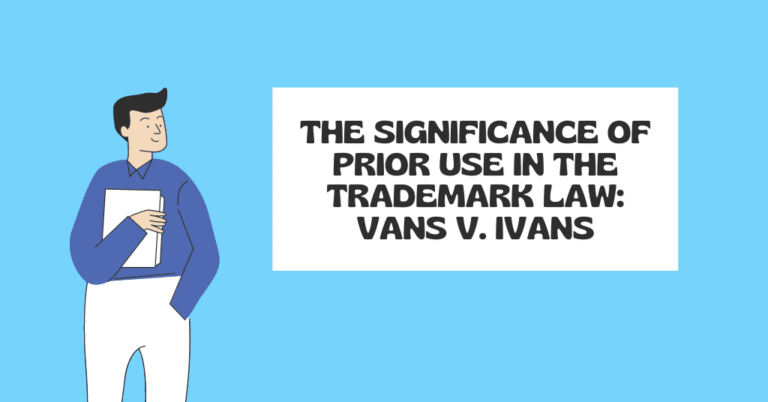In the complex realm of intellectual property rights, few principles hold as much significance as the concept of “prior use” in Indian trademark law. The recent ruling by the Delhi High Court in the Vans v. Ivans case has brought attention to the fundamental concept of giving precedence to the first user of a trademark in the market.
The Vans v. Ivans Case:
The case centred on a disagreement between Vans Inc., a well-known American footwear and apparel company, and FCB Garment Tex, an Indian company that used the “IVANS” trademark. Vans Inc. filed a request to invalidate FCB Garment Tex’s trademark registration in India, claiming that their “VANS” mark had recently gained recognition as a well-known trademark in the country. Nevertheless, the Delhi High Court ruled in favour of FCB Garment Tex, citing the prior use principle.
Important Factors in the Court’s Decision
The court’s ruling was influenced by several crucial elements. Firstly, it emphasised that FCB Garment Tex had been using the “IVANS” mark in India for years before Vans Inc. entered the market, applying the “first in the market” principle. Furthermore, the court made it clear that simply declaring a trademark as well-known does not automatically give the owner the authority to cancel other marks that were used earlier in India. Finally, the court determined that FCB Garment’s utilisation of the marks was both sincere and simultaneous, granting them protection under Section 12 of the Trade Marks Act.
Supporting the Principle of Prior Use
This landmark ruling is a strong affirmation of the prior use principle in Indian trademark law. This principle emphasises that the initial user of a trademark in the market holds greater rights compared to later users, regardless of their registration status. This concept is deeply embedded in the Indian Trade Marks Act, 1999, and aims to safeguard businesses that have dedicated significant time and resources to establish their brand identity in the market.
The Reasoning Behind Prior Use
There are several reasons behind the prior use principle. It strives to recognise and safeguard businesses that have proactively built their brands in the marketplace. By prioritising the initial user, the law recognises the dedication and resources required to establish a strong brand presence and cultivate customer loyalty. This principle also helps to prevent unfair competition by ensuring that well-known brands are not replaced by new ones with similar marks, thus maintaining consumer trust and market stability.
Territorial Nature of Trademark Rights
In addition, the principle of prior use acknowledges the territorial nature of trademark rights. The Vans v. Ivans case clearly illustrates that having a worldwide reputation is not enough to establish legal rights in a particular jurisdiction. The principle highlights the significance of establishing a tangible market presence and utilising a trademark within India, rather than solely relying on international recognition or registration in other nations.
Engaging with well-known Trademarks
The prior use principle also has implications for other aspects of trademark law, including the recognition of well-known trademarks. The ruling by the Delhi High Court provides clarity on the advantages of having a well-known trademark status, while also acknowledging the rights of prior users in the market. This delicate equilibrium ensures the safeguarding of well-known local brands while acknowledging the prestige and recognition of globally renowned trademarks.
Practical Considerations for Trademark Owners
In practice, trademark owners are faced with a significant burden of maintaining proper documentation of their trademark use due to the prior use principle. This encompasses sales records, advertisements, and proof of customer recognition. Consistent and authentic use of the mark is essential, as any substantial gaps in usage can undermine a prior use claim.
Conclusion
Ultimately, the verdict of the Delhi High Court in the Vans v. Ivans case serves as a strong affirmation of the prior use principle within Indian trademark law. It emphasises the significance of having a strong market presence and building a reputable brand in order to establish and safeguard trademark rights in India. As the country continues to attract global brands while nurturing its own business ecosystem, this principle will undoubtedly have a significant impact on the development of trademark strategies and dispute resolutions.







